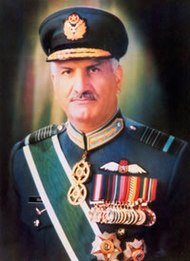Mushaf Ali Mir | |
|---|---|
 ACM Mushaf Ali Mir (1947–2003) | |
| Chief of Air Staff | |
| In office 20 November 2000 – 20 February 2003 | |
| Preceded by | ACM Pervaiz Mehdi Qureshi |
| Succeeded by | ACM Kalim Sadat |
| Chairman Pakistan Aeronautical Complex | |
| In office 1999–2000 | |
| Personal details | |
| Born | Mushaf Ali Mir 5 March 1947 Lahore, Punjab, British India (now Lahore in Punjab in Pakistan) |
| Died | 20 February 2003 (aged 55) Kohat Pass, Kohat District, Pakistan |
| Cause of death | Aviation accident |
| Resting place | Mominpura Cemetery |
| Relatives | Yunus Hussain (brother-in-law)[1] |
| Nickname(s) | Mashoo Mir |
| Military service | |
| Allegiance | Pakistan |
| Branch/service | Pakistan Air Force |
| Years of service | 1966–2003 |
| Rank | Air Chief Marshal |
| Unit | No. 25 Squadron Night Strike Eagles |
| Commands | |
| Battles/wars | |
| Awards | |
Air Chief Marshal Mushaf Ali Mir NI(M), HI(M), SI(M), SBt (Punjabi, Urdu: مصحف على مير; 5 March 1947 – 20 February 2003) was a Pakistani four-star air officer who served as the Chief of Air Staff of the Pakistan Air Force (PAF), appointed on 20 November 2000 until his accidental death in a plane crash on 20 February 2003.[2]
A fighter pilot and a strategist, he briefly served at command level in the ISI before controversially being promoted as a four-star air officer to command the air force in 2000.[3] In 2001–02, he also commanded and provided the strategy to deploy troops during the military standoff with India. In addition, Air Chief Marshal Mir later went onto facilitate the United States military's war logistics for war operations in Afghanistan. His appointment was cut short when a former PAF Fokker F-27 in which he was a passenger crashed near Kohat, Pakistan.
His death has been subject of numerous conspiracy theories, with many American authors charging him of having advanced knowledge on terrorist attacks in the United States in 2001.[4]
- ^ Cite error: The named reference
Sentinelswas invoked but never defined (see the help page). - ^ Cite error: The named reference
Defence Journal, 2003was invoked but never defined (see the help page). - ^ Cite error: The named reference
The Hindu, Pakistan Bureauwas invoked but never defined (see the help page). - ^ Cite error: The named reference
Simon and Schuster, 2004was invoked but never defined (see the help page).